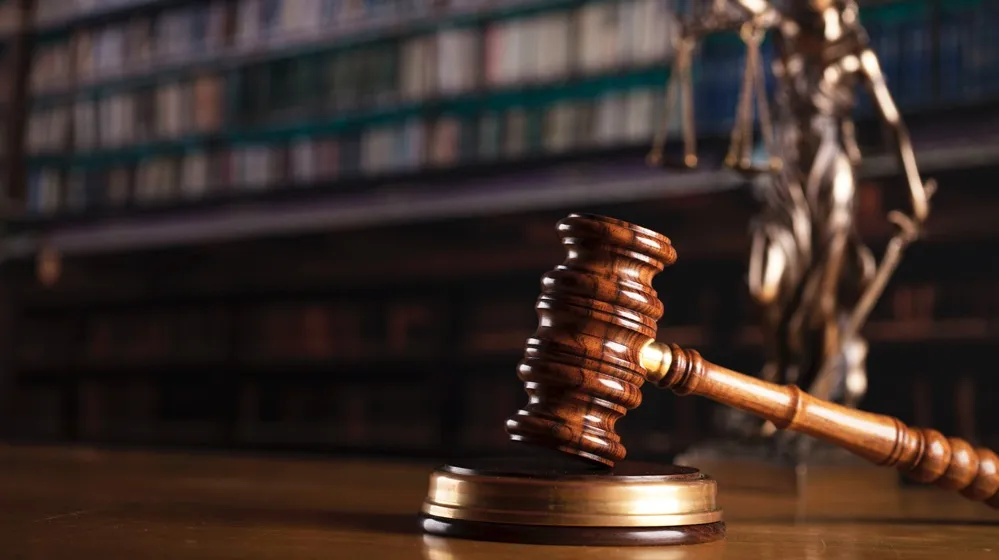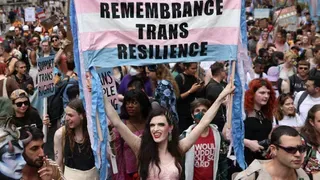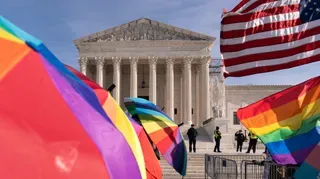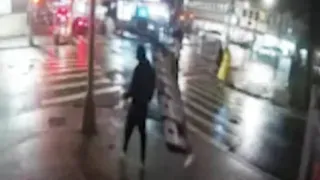July 4, 2015
Few Problems at Pink Party
Kilian Melloy READ TIME: 4 MIN.
Thousands of people enjoyed a relatively trouble-free Pink Party in the streets of San Francisco's Castro district last weekend, soothing some nerves in a neighborhood that had grown weary of chaotic festivals the night before each year's LGBT Pride parade.
Starting and ending the event early seemed to mellow the crowd this year, which marked the first time the San Francisco LGBT Community Center had overseen the event. The party replaced the Pink Saturday celebration, which the Sisters of Perpetual Indulgence organized for decades before abandoning it for this year, citing concerns about violence.
Clearing the streets after the Saturday, June 27 event ended proved problematic, but there are indications the Pink Party will go on again next year.
There were some reports of public intoxication and scuffles, but many at the party simply took advantage of having a place to celebrate their identities.
Early Saturday night, Juan Camacho, 17, sat on 20-year-old Michael Willison's shoulders in the intersection of 18th and Castro streets. Camacho, who's gay, was wearing a black mesh top and silver hot pants as he held up a rainbow flag behind his back.
He said he came "to celebrate who I am."
Camacho lives in the small northern California city of Arcata and said, "I like being around more my kind of people," and others at the Castro party were "so kind and sweet."
"It means the world," he said, and there was nothing else like it for him. "This is the place I want to be."
'No criticisms'
A couple days after the party, which included DJs, dancing, and food, Rebecca Rolfe, the community center's executive director, said, "I thought it was fantastic."
Rolfe said she wasn't aware of any "significant violence" and added, "I literally have heard no criticisms."
Gay Supervisor Scott Wiener, whose District 8 includes the Castro, brought in the center to produce the event after the Sisters announced in February they wouldn't organize it this year.
Violent incidents had marred the festival for years, especially after Stephen Powell, 19, was fatally shot around the time the 2010 party ended, and a Sister and her husband were attacked at last year's event.
"I think, generally, it went really well" this year, Wiener said. "... There are always challenges at that size of a crowd, but there were remarkably few incidents."
Rafael Mandelman, LGBT community center board chair, said he was happy with how the party went.
"I think there is always room for improvement but I was pleased with the Pink Party," Mandelman told the Bay Area Reporter . "It was great to see the diversity of LGBT people and their friends in the Castro."
At about 8:30 Saturday night, after the music was turned off and the party was officially over, police Captain Dan Perea said the event had gone "very well," and he credited the center and other organizers for doing "a great job."
Last year's party went from 5 to 10:30 p.m. Perea, who oversees Mission station, which includes the Castro, said holding the celebration earlier this year "absolutely" made a difference.
There's "less drinking time during the day," he said, and partygoers "haven't had as much of an opportunity to get in trouble."
After the event, police reported there had been 16 arrests for public drunkenness Saturday, far outweighing arrests for other incidents. Most, if not all of the reports, were from in or around the Castro, according to Officer Carlos Manfredi, a police spokesman.
When the B.A.R. left at about 9, the area was still crowded with people, and the streets around the event remained closed longer than expected.
Asked about the slow street reopening, Rolfe said, "There were upwards of 60,000 people there. It takes a while to get those folks moving. ... It just took a while to get all the equipment moved out and to get the streets reopened."
Mandelman said it was a "huge project" to reopen the streets.
"Doing it safely just took a little bit longer than maybe we were hoping for at our most optimistic," he said, adding that he was there until 11 p.m.
Fifty anti-racist activists surrounded the rainbow flagpole in Harvey Milk Plaza and hoisted a banner that read "QTIPOC Resistance Liberation." Photo: Rick Gerharter
Castro resident Daniel Bergerac, who's president of the Castro Merchants group and co-owns Mudpuppy's Tub and Scrub near Castro and 18th streets, said he and others haven't had a chance to debrief, but so far "the reviews are 50/50."
Bergerac said complaints have included people drinking in the streets, which they weren't supposed to do.
In a protest, just after the Pink Party started, activists scaled about a quarter way up the flagpole that flies the giant rainbow flag and raised a banner on behalf of queer, trans, and intersex people of color that read "QTIPOC Resistance Liberation." The rainbow flag wasn't removed, and the protest banner remained up until sometime Tuesday.
Event's future
Rolfe recently estimated total costs for the Pink Party would be $150,000 to $160,000, though she said the final budget figure "could still vary pretty significantly."
Wiener said the plan has been for the city to cover the entire cost of the event. (Rolfe did say about $7,000 had been raised through sponsorships this year.)
The supervisor, who credited the center for taking charge of the event with less than four months to plan it, indicated the city may be pitching in for the next several years.
"Our hope is for the venture to become financially self-sustaining," he said, but "it may take a few years to get there."
"We'll have a discussion, certainly, for next year," Wiener said.
Asked if the center would be involved again next year, Rolfe said, "We won't know that for more than a couple weeks." She said producers, who also include E. Cee Productions, want to get feedback from stakeholders and "really think about what is a sustainable model for this event as we move forward."
Kilian Melloy serves as EDGE Media Network's Associate Arts Editor and Staff Contributor. His professional memberships include the National Lesbian & Gay Journalists Association, the Boston Online Film Critics Association, The Gay and Lesbian Entertainment Critics Association, and the Boston Theater Critics Association's Elliot Norton Awards Committee.





